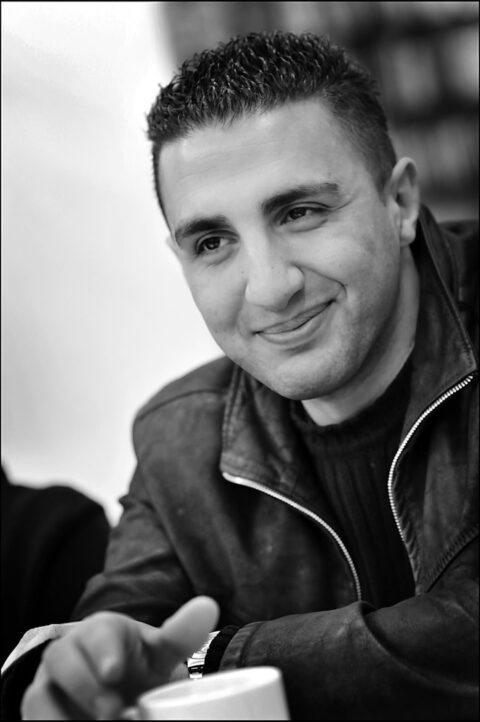 These four poems by the Palestinian poet Najwan Darwish all take up, in different ways, questions pertaining to loss — of land and life, of course — an ineluctable theme in the work of most contemporary Palestinian authors. But here we can also see evocations of the loss of language, memory, history, and even the loss of one’s own self. That which is lost is also that which binds the poet, that which shapes the contours of an identity that seems, at times, almost too tragic and painful to bear. — Kareem James Abu-Zeid, translator
These four poems by the Palestinian poet Najwan Darwish all take up, in different ways, questions pertaining to loss — of land and life, of course — an ineluctable theme in the work of most contemporary Palestinian authors. But here we can also see evocations of the loss of language, memory, history, and even the loss of one’s own self. That which is lost is also that which binds the poet, that which shapes the contours of an identity that seems, at times, almost too tragic and painful to bear. — Kareem James Abu-Zeid, translator
/ / / / /
This Loss
So difficult, this loss:
to imagine your pages
are those of a dead man,
and that death’s colleagues
are the ones
consoling you now.
* * * * *
Words at the Entrance to Jerusalem
My lord, God’s Messenger bound me
between Mecca and Jerusalem,
and I can’t leave the space between them.
I’m waiting for him,
and I’d never live in any place
the Buraq doesn’t land …
But I, in some of my nightmares,
see invaders cleansing the Mu‘jam al-Buldān —
the “Dictionary of Countries” —
of the tongue of the Arabs,
I see them after they’ve all become
sha‘b bawān, the people
of a distant land,
where “the Arab boy among them
seems strange of face,
and strange of hand.”
You know this all too well.
And so I wake, shaking, and tell myself:
Don’t stay in a land where the tongue of the Arabs
is being cut off,
don’t stay in a land
where it’s effaced from the tombstones.
After all, what would Mecca and Jerusalem be
without their language?
* * * * *
Luckily
I find it
in the trees of the courtyard,
in the Byzantine stones and Ottoman architecture,
in the grass of the third of July,
in the grief-stricken land and the immortal sky
(I prefer the grief-stricken land),
in a brief recitation
and the migrations of peoples
from Asia Minor
to the eloquent Arabic tongue,
in the Most Gracious, the Most Merciful —
in all of this I find my self
but luckily lose it again
in short order.
* * * * *
Labyrinths
Green and blue labyrinths:
From them the city stitched
the school uniforms,
the grey of the houses,
the deceptions of the wind.
And from blue, and green, and grey
we stitched the city.
/ / / / /
هذا البَدَد
صعبٌ هذا البَدَد
أَنْ تَتَخَيَّلَ أَوراقَكَ أَوراقَ مَيِّتٍ
.وَيُواسيكَ زُملاءُ مَوْت
كلام عند مدخل القدس
يا سيّدي، أَنا، رسولُ الله قيَّدَني بين القُدْس ومَكّة
.لا أَستطيع أَنْ أَبْرَحَ الفَضاء الذي بينهُما
إِنّني أَنْتَظِرُه
…وإنَّ أَرضاً لا يَهْبِطُ البُراقُ فيها لَسْتُ بِساكِنِها
لكِنّي في بَعْضِ كوابيسي
أَرى غُزاةً يُعقِّمون مُعْجَمَ البُلدان مِنْ لُغة العَرَب
أَراها وقد صارت كُلُّها “شِعْبَ بَوانٍ”
حَيْثُ “الفَتى العَربَيُّ فيها غريبُ اليَدِ والوَجْهِ…” كما تَعْرِف
:فأَسْتَيْقِظُ وأَنا أَرتَجِف وأَقولُ لنَفْسي
لا تَبْقَيْ في أَرْضٍ يُقْطَعُ فيها لسانُ العَرَب
لا تبقيْ في أَرضٍ تُمْسَحُ فيها لُغَتُهُم
عَنْ شَواهِدِ قُبُورِهِم
ثُمَّ ما مكّةَ والقُدُس مِنْ دونِ لُغَتِهِم؟
ولِحُسْنِ الحّظ
في أَشجار الفِناء أَعثرُ عليها
في الأحجار البيزنطيّة والعمارة العثمانيّة
في عُشْبِ الثالثِ مِنْ تمّوز
في الأرض الحزينة والسّماء الخالدة
(أُفضِّلُ الأرضَ الحزينة)
في تِلاوةٍ قصيرةٍ
وهِجراتِ شعوبٍ مِنْ آسية الصُّغرى إلى اللِّسان العربيّ المُبين
في الرحمنِ الرّحيم
أَعثر على نَفْسي
.ولِحُسْنِ الحّظ سريعاً ما أُضيِّعها
متاهات
متاهاتٌ خضراءُ وزرقاء
منها نَسَجَتِ المَدينةُ “جُرْزايَتَها” المَدرسيّة
رماديَّ البُيوت
مُخاتَلاتِ الرّيح
مِنَ الأَزرقِ والأَخضرِ والرَّماد
.نَسَجْنا المَدينة